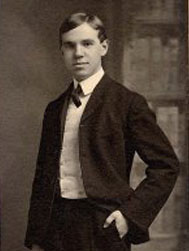Charles Griffes
| Charles Tomlinson Griffes | |
|---|---|

Charles Griffes at the beginning of the twentieth century
|
|
| Born |
September 17, 1884 Elmira, New York |
| Died | April 8, 1920 (aged 35) New York City |
| Resting place | Bloomfield Cemetery, Bloomfield, Essex County, New Jersey, U.S. |
| Education | Stern Conservatory |
| Occupation | Composer |
| Years active | 1910–1919 |
Charles Tomlinson Griffes (pron. GRIFF-iss) (September 17, 1884 – April 8, 1920) was an American composer for piano, chamber ensembles and voice.
Griffes was born in Elmira, New York. After early studies on piano and organ in his home town, he went to Berlin to study with pianist Ernst Jedliczka at the Stern Conservatory. While there, Griffes also enjoyed a brief but influential mentorship by composer Engelbert Humperdinck. On returning to the U.S. in 1907, he became director of music studies at the Hackley School for boys in Tarrytown, New York, a post which he held until his early death thirteen years later.
Griffes is the most famous American representative of musical Impressionism. He was fascinated by the exotic, mysterious sound of the French Impressionists, and was compositionally much influenced by them while he was in Europe. He also studied the work of contemporary Russian composers (for example Scriabin), whose influence is also apparent in his work, for example in his use of synthetic scales.
His most famous works are the White Peacock, for piano (1915, orchestrated in 1919); his Piano Sonata (1917–18, revised 1919); a tone poem, The Pleasure Dome of Kubla Khan, after the fragment by Coleridge (1912, revised in 1916), and Poem for Flute and Orchestra (1918). He also wrote numerous programmatic pieces for piano, chamber ensembles, and for voice. The amount and quality of his music is impressive considering his short life and his full-time teaching job, and much of his music is still performed. His unpublished Sho-jo (1917), a one-act pantomimic drama based on Japanese themes, is one of the earliest works by an American composer to show direct inspiration from the music of Japan.
...
Wikipedia
